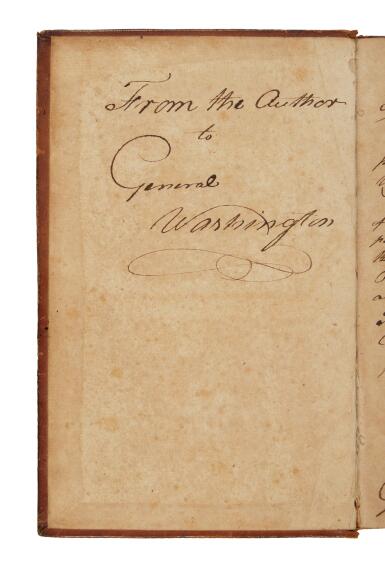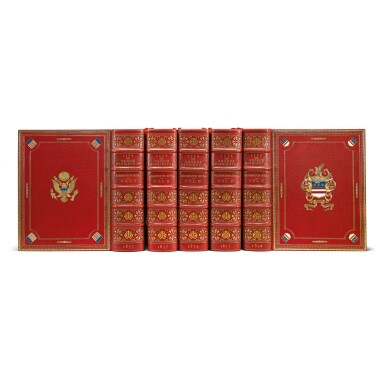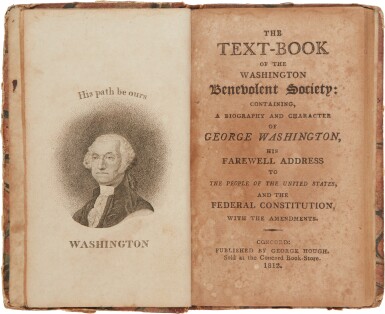(Washington, George) [Thomas, Gordon], Another Cordial for Low-Spirits. London: R. Griffiths, 1751
Volume 2 only, 12mo. Some leaves toned. Contemporary brown calf gilt; bumped at corners, light wear to covers, front joint cracked but sound, expertly strengthened at front hinge. Maroon morocco solander case, morocco clamshell box.
Signed by Washington, one of the earliest printed books owned by him in his youth.
George Washington was not classically educated, nor did he learn another language aside from English. Despite lacking the formal education that his elder brothers received, he sought to broaden his mind and ordered many books from England. His library at Mount Vernon is well attested to, a complete inventory being made in 1783, and classical and modern literary works formed the bulk of the collection, along with books on agriculture, history and politics. It eventually consisted of over 1,200 titles, countering John Adams' impression "that Washington was not a scholar is certain. That he was too illiterate, unlearned, unread for his station is equally past dispute."
Thomas Gordon was a Scottish writer that was widely read by the American founding fathers, greatly influencing their ideas of republicanism in the eighteenth century. "The bulk of the founding fathers' reading, apart from history, was concerned with political and legal tracts whose main focus was directed toward two subjects—liberty and property—and toward the social, constitutional, and legal institutions best adapted to the preservation of man's 'sacred' rights in regard to those subjects...there was little disagreement as to the indispensable 18th century writers: they are Charles Danenant, John Trenchard, Thomas Gordon, Bolingbroke and James Burgh" (Founding Fathers' Library). Gordon translated the classical authors, including Tacitus, Sallust and Cicero. Most notably, he published Cato's Letters, which were "Reprinted hundreds of times in colonial newspapers, they were perhaps the most widely read source for arguments for freedom of the press, and against arbitrary government power and taxation" (Jacobson). The present volume contains essays such as "The True Picture of a Modern Tory," "A Vindication of the Quakers," and "The Creed of an Independant Whig." It is recorded in Lane, Inventory of Washington's Library, p. 490 as ("an additional title not included on the original inventory").
This is one of the earliest printed books from Washington's library. If signed around the date of publication, as is indicated by the style of the signature, this would have been inscribed when he was around twenty years old. The upright and condensed signature features a shorter "s" than examples from the later 1750s, and is comparable to signatures on his early survey manuscripts, though these have a more decorative quality than book ownership inscriptions. Washington travelled to Barbados with his brother Lawrence in 1751. Upon his brother's death from tuberculosis in July 1752, he leased Mount Vernon from his widow Anne and took over management of the estate. This may therefore have been one of the first books placed in the library at his new home.
In his will, George Washington bequeathed his library to his nephew Bushrod Washington. The library remained largely intact at Mount Vernon, which Bushrod also inherited, until his own death in 1829, when it was divided between two of his nephews, George Corbin Washington and John Augustine Washington. In 1848, George Corbin Washington sold some 350 books and 450 unbound pamphlets from his portion of the library to Henry Stevens, who eventually placed it in the Boston Athenaeum, where it remains today as the largest single collection of Washington’s books. The part of the library that descended to John Augustine Washington was dispersed at various auction sales between 1876 and 1891, and the present volume has been traced to the 1876 sale of Washingtoniana, lot 134.
A well provenanced volume by a hugely influential author on the future leader.
PROVENANCE:George Washington (ownership inscription) — Bushrod Washington (1762-1829, by bequest) — John A. Washington, Jr. (1820-1861, by bequest) — Lawrence Washington (1854-1920, by bequest, his sale of Washingtoniana, Thomas and Sons, Philadelphia, 28 November 1876, lot 134) — Howard Edwards — A.S.W. Rosenbach, cited in his "The Libraries of the Presidents of the United States," in Proceedings of the American Antiquarian Society, October 1934, p.6) and in Book Hunter's Holiday, p.134) — Christie's New York, Printed Books and Manuscripts, 15 December 2005, lot 269
(Washington, George) [Thomas, Gordon], Another Cordial for Low-Spirits. London: R. Griffiths, 1751
Volume 2 only, 12mo. Some leaves toned. Contemporary brown calf gilt; bumped at corners, light wear to covers, front joint cracked but sound, expertly strengthened at front hinge. Maroon morocco solander case, morocco clamshell box.
Signed by Washington, one of the earliest printed books owned by him in his youth.
George Washington was not classically educated, nor did he learn another language aside from English. Despite lacking the formal education that his elder brothers received, he sought to broaden his mind and ordered many books from England. His library at Mount Vernon is well attested to, a complete inventory being made in 1783, and classical and modern literary works formed the bulk of the collection, along with books on agriculture, history and politics. It eventually consisted of over 1,200 titles, countering John Adams' impression "that Washington was not a scholar is certain. That he was too illiterate, unlearned, unread for his station is equally past dispute."
Thomas Gordon was a Scottish writer that was widely read by the American founding fathers, greatly influencing their ideas of republicanism in the eighteenth century. "The bulk of the founding fathers' reading, apart from history, was concerned with political and legal tracts whose main focus was directed toward two subjects—liberty and property—and toward the social, constitutional, and legal institutions best adapted to the preservation of man's 'sacred' rights in regard to those subjects...there was little disagreement as to the indispensable 18th century writers: they are Charles Danenant, John Trenchard, Thomas Gordon, Bolingbroke and James Burgh" (Founding Fathers' Library). Gordon translated the classical authors, including Tacitus, Sallust and Cicero. Most notably, he published Cato's Letters, which were "Reprinted hundreds of times in colonial newspapers, they were perhaps the most widely read source for arguments for freedom of the press, and against arbitrary government power and taxation" (Jacobson). The present volume contains essays such as "The True Picture of a Modern Tory," "A Vindication of the Quakers," and "The Creed of an Independant Whig." It is recorded in Lane, Inventory of Washington's Library, p. 490 as ("an additional title not included on the original inventory").
This is one of the earliest printed books from Washington's library. If signed around the date of publication, as is indicated by the style of the signature, this would have been inscribed when he was around twenty years old. The upright and condensed signature features a shorter "s" than examples from the later 1750s, and is comparable to signatures on his early survey manuscripts, though these have a more decorative quality than book ownership inscriptions. Washington travelled to Barbados with his brother Lawrence in 1751. Upon his brother's death from tuberculosis in July 1752, he leased Mount Vernon from his widow Anne and took over management of the estate. This may therefore have been one of the first books placed in the library at his new home.
In his will, George Washington bequeathed his library to his nephew Bushrod Washington. The library remained largely intact at Mount Vernon, which Bushrod also inherited, until his own death in 1829, when it was divided between two of his nephews, George Corbin Washington and John Augustine Washington. In 1848, George Corbin Washington sold some 350 books and 450 unbound pamphlets from his portion of the library to Henry Stevens, who eventually placed it in the Boston Athenaeum, where it remains today as the largest single collection of Washington’s books. The part of the library that descended to John Augustine Washington was dispersed at various auction sales between 1876 and 1891, and the present volume has been traced to the 1876 sale of Washingtoniana, lot 134.
A well provenanced volume by a hugely influential author on the future leader.
PROVENANCE:George Washington (ownership inscription) — Bushrod Washington (1762-1829, by bequest) — John A. Washington, Jr. (1820-1861, by bequest) — Lawrence Washington (1854-1920, by bequest, his sale of Washingtoniana, Thomas and Sons, Philadelphia, 28 November 1876, lot 134) — Howard Edwards — A.S.W. Rosenbach, cited in his "The Libraries of the Presidents of the United States," in Proceedings of the American Antiquarian Society, October 1934, p.6) and in Book Hunter's Holiday, p.134) — Christie's New York, Printed Books and Manuscripts, 15 December 2005, lot 269















Testen Sie LotSearch und seine Premium-Features 7 Tage - ohne Kosten!
Lassen Sie sich automatisch über neue Objekte in kommenden Auktionen benachrichtigen.
Suchauftrag anlegen